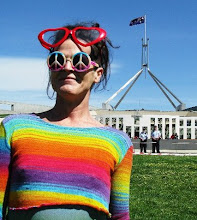Victory for intersex rights attacked
Victory for intersex rights attacked
Rachel Evans, Sydney
20 March 2010Two weeks ago, Norrie won the right to have “non gender specific” written on zie's (non-gendered pronoun) birth certificate.
A seasoned queer and refugee rights activist, Norrie spent two months going through the process with the NSW Registry of Births, Deaths and Marriages, and received the welcome news the night before Mardi Gras.
At 23, Norrie undertook hormone treatments and surgery to construct a vagina, receiving a gender recognition certificate as female. Norrie later came to feel that female was not right either, so ceased taking hormones and identified as neuter.
Norrie had confirmation from two doctors that zie could not be categorised as female or male; and zie filed the doctors’ assessments with the registry. The initial positive ruling of “non gender specific” was a huge win for the intersex (historically referred to as hermaphrodite) community who identify as neither men nor women.
On March 18, Norrie said: “One in 100 people display differences to male/female binary. That's a lot of intersex people. The decision meant I can travel without a sex on my documents: I am not a man or a woman but I have aspects of both.”
The registry’s decision may have been a world first. Norrie's victory was on the front cover of the Sydney Morning Herald, and featured in media in Russia, China, and Norrie’s birthplace of Scotland. Support was overwhelming, Norrie said.
“Thousands of people have contacted me world-wide to show their support: they support it because, just as race and religion used to be part of your legal identity, so too should sex be a thing of the legal identity past”, Norrie said.
However, the conservative Labor state government stepped in, and on March 16, Norrie received a telephone call from the registry telling zie it was going to try to rescind its decision, because of pressure from higher up in the government.
“A harassing call told me that there had been a ‘legal error’, and that the former decision was invalid and the certificate would be made invalid”, Norrie said. “I was devastated by the news.”
“The decision is a breach of human rights. It's a hideously humiliating position to find myself in and makes a mockery of my human rights. I feel violated by the attorney-general's office."
Sex and Gender Education (SAGE) campaigns for sex/gender-diverse people’s rights. SAGE believes the Australian Human Rights Commission’s 2009 Sex Files Report influenced the registry’s original, progressive, decision. The report recommended: “Person[s] over the age of 18 years should be able to choose to have an unspecified sex noted on documents and records.”
Debate in the intersex community has erupted. In a March 17 Sydney Star Observer article, Gina Wilson from OII Australia (part of the international intersex organisation) wrote: “We think having ‘not specified’ on a child’s birth certificate will add to their burden.
“If this were a non-prejudiced society, it would be fair enough — but it’s not. Children struggle enough with a non-conforming body and the issues around that without having to struggle with a document that declares that to anybody who sees it.”
Wilson argued “it was adequate for parents to give intersex children unisex names and a temporary gender designation for documents as male or female until they are old enough to decide for themselves.”
In response to the registry’s back flip, Norrie, joined by SAGE, NSW Greens leader Lee Rhiannon, Community Action Against Homophobia, the Socialist Alliance and 15 other activists lodged a complaint on March 18 at the Human Rights Commission.
On March 18, ABC Online said attorney-general John Hatzistergos had denied he was behind the registry’s decision, when questioned by Rhiannon in parliament. But his director-general had discussed the matter with the registrar, and they’d decided to obtain legal advice.
Hatzistergos said: “Advice from the Crown solicitor is that the registrar may only issue a recognised details certificate or new birth certificate following a change of sex in either male or female gender.”
Norrie and supporters pledged to continue the fight for the “non gender specific” status.
At 23, Norrie undertook hormone treatments and surgery to construct a vagina, receiving a gender recognition certificate as female. Norrie later came to feel that female was not right either, so ceased taking hormones and identified as neuter.
Norrie had confirmation from two doctors that zie could not be categorised as female or male; and zie filed the doctors’ assessments with the registry. The initial positive ruling of “non gender specific” was a huge win for the intersex (historically referred to as hermaphrodite) community who identify as neither men nor women.
On March 18, Norrie said: “One in 100 people display differences to male/female binary. That's a lot of intersex people. The decision meant I can travel without a sex on my documents: I am not a man or a woman but I have aspects of both.”
The registry’s decision may have been a world first. Norrie's victory was on the front cover of the Sydney Morning Herald, and featured in media in Russia, China, and Norrie’s birthplace of Scotland. Support was overwhelming, Norrie said.
“Thousands of people have contacted me world-wide to show their support: they support it because, just as race and religion used to be part of your legal identity, so too should sex be a thing of the legal identity past”, Norrie said.
However, the conservative Labor state government stepped in, and on March 16, Norrie received a telephone call from the registry telling zie it was going to try to rescind its decision, because of pressure from higher up in the government.
“A harassing call told me that there had been a ‘legal error’, and that the former decision was invalid and the certificate would be made invalid”, Norrie said. “I was devastated by the news.”
“The decision is a breach of human rights. It's a hideously humiliating position to find myself in and makes a mockery of my human rights. I feel violated by the attorney-general's office."
Sex and Gender Education (SAGE) campaigns for sex/gender-diverse people’s rights. SAGE believes the Australian Human Rights Commission’s 2009 Sex Files Report influenced the registry’s original, progressive, decision. The report recommended: “Person[s] over the age of 18 years should be able to choose to have an unspecified sex noted on documents and records.”
Debate in the intersex community has erupted. In a March 17 Sydney Star Observer article, Gina Wilson from OII Australia (part of the international intersex organisation) wrote: “We think having ‘not specified’ on a child’s birth certificate will add to their burden.
“If this were a non-prejudiced society, it would be fair enough — but it’s not. Children struggle enough with a non-conforming body and the issues around that without having to struggle with a document that declares that to anybody who sees it.”
Wilson argued “it was adequate for parents to give intersex children unisex names and a temporary gender designation for documents as male or female until they are old enough to decide for themselves.”
In response to the registry’s back flip, Norrie, joined by SAGE, NSW Greens leader Lee Rhiannon, Community Action Against Homophobia, the Socialist Alliance and 15 other activists lodged a complaint on March 18 at the Human Rights Commission.
On March 18, ABC Online said attorney-general John Hatzistergos had denied he was behind the registry’s decision, when questioned by Rhiannon in parliament. But his director-general had discussed the matter with the registrar, and they’d decided to obtain legal advice.
Hatzistergos said: “Advice from the Crown solicitor is that the registrar may only issue a recognised details certificate or new birth certificate following a change of sex in either male or female gender.”
Norrie and supporters pledged to continue the fight for the “non gender specific” status.



0 Comments:
Post a Comment
<< Home